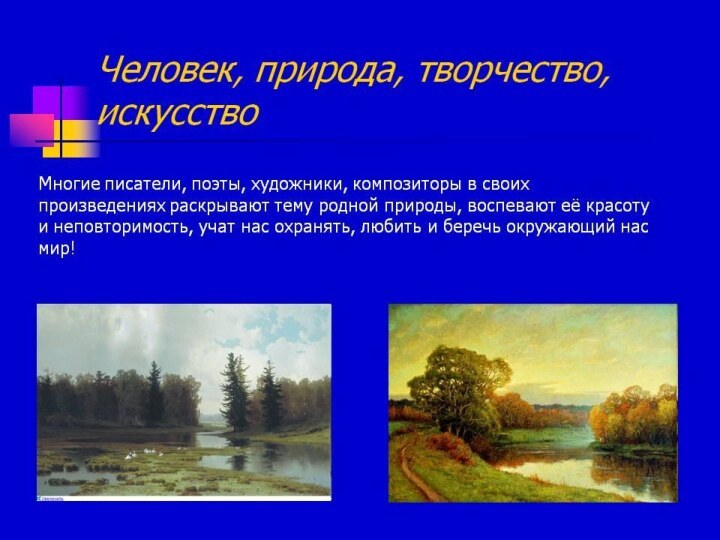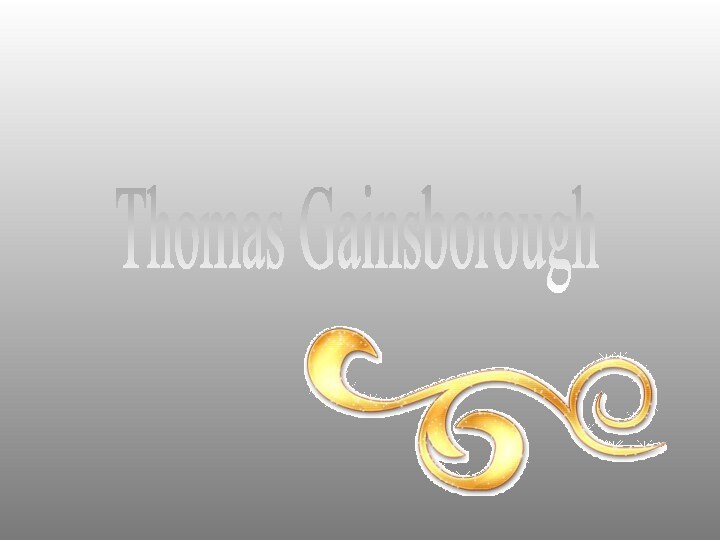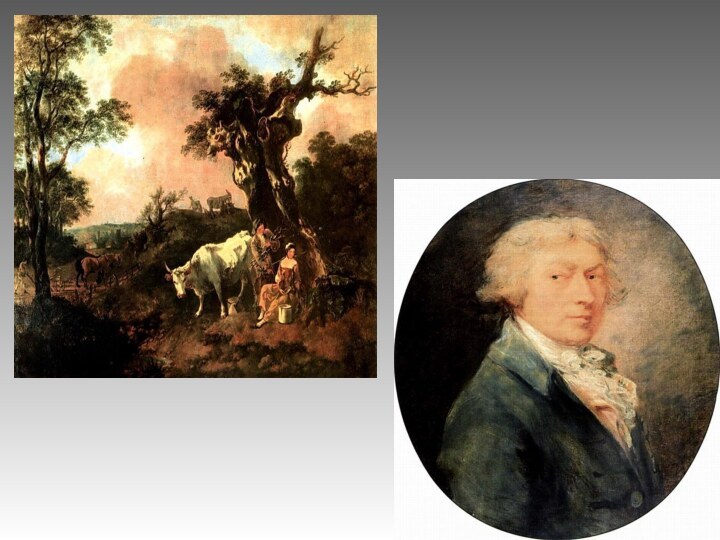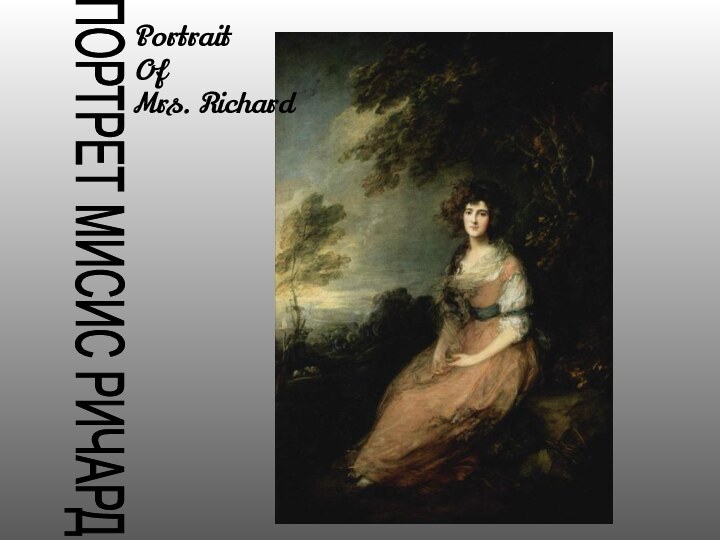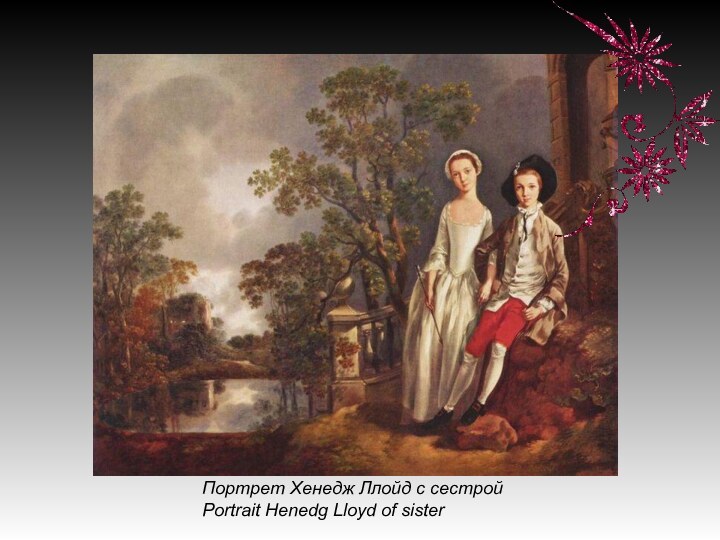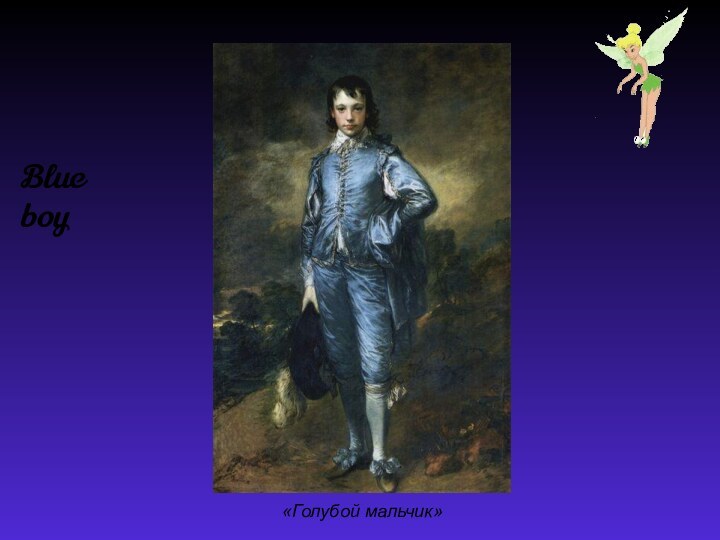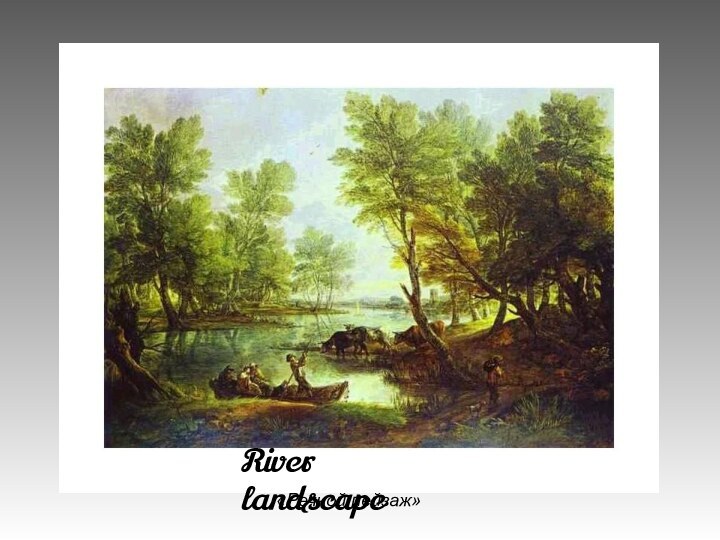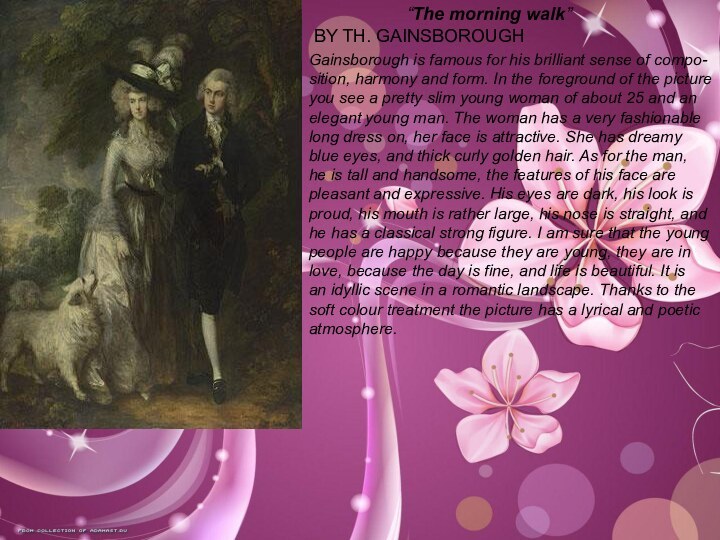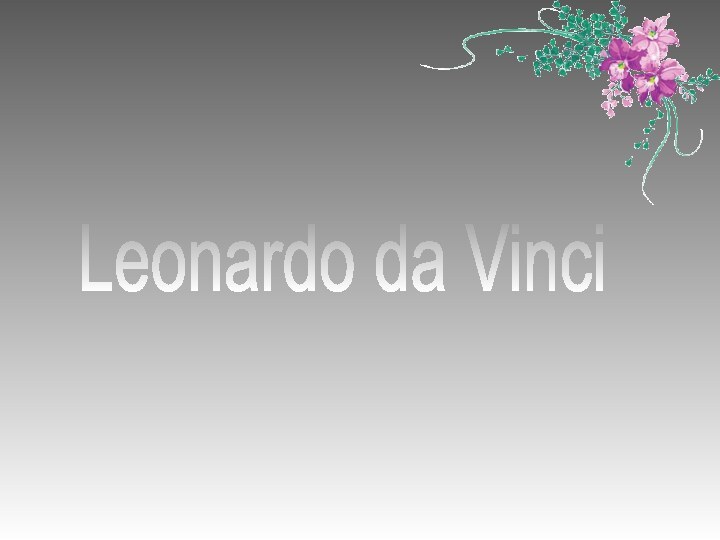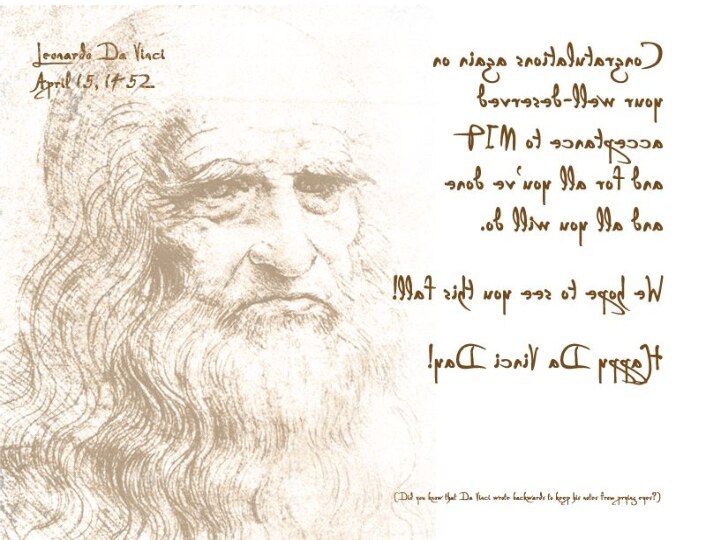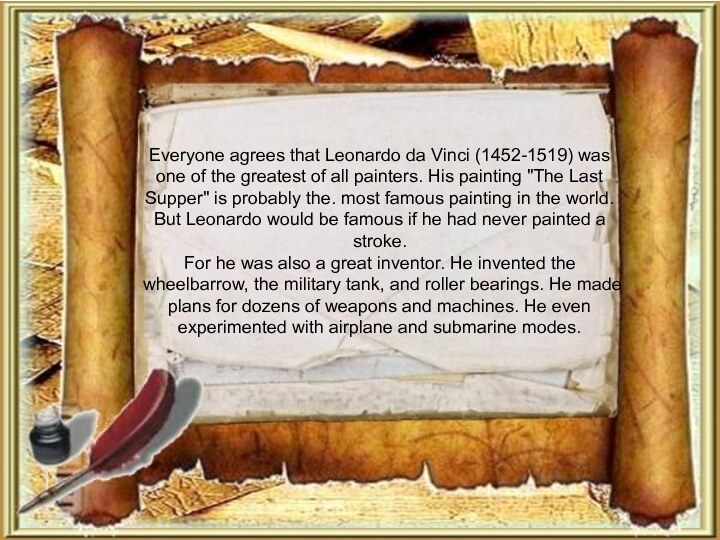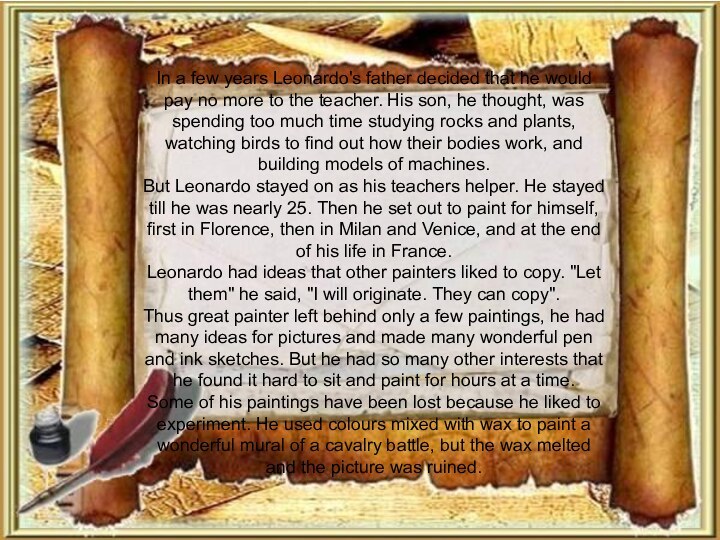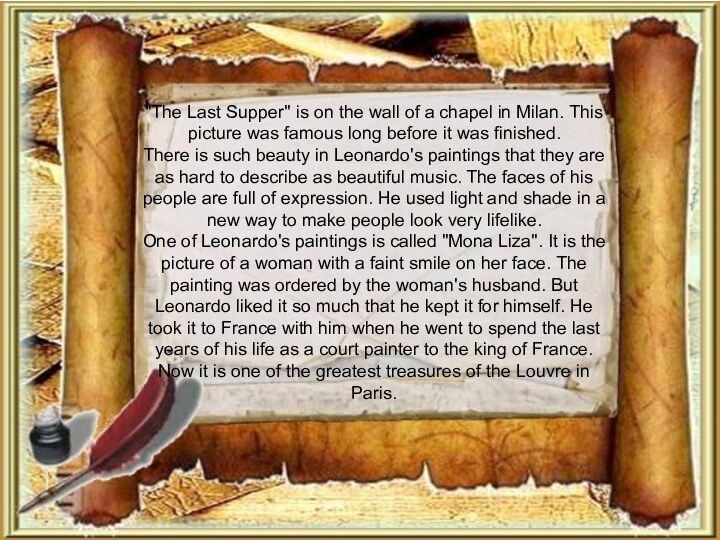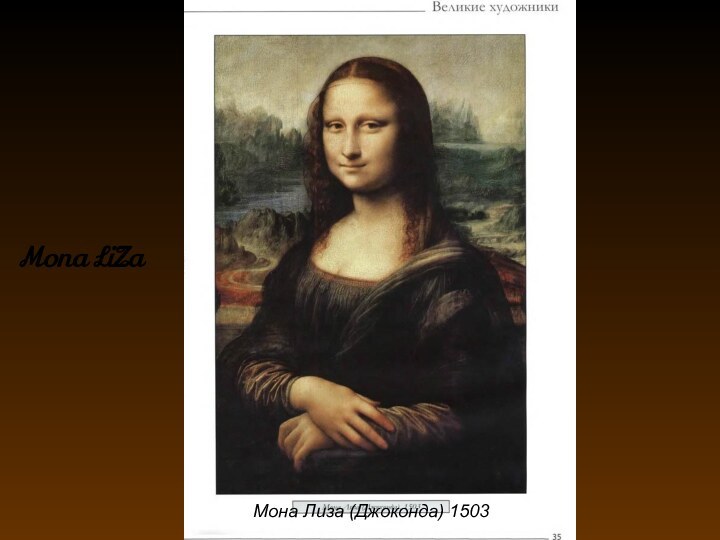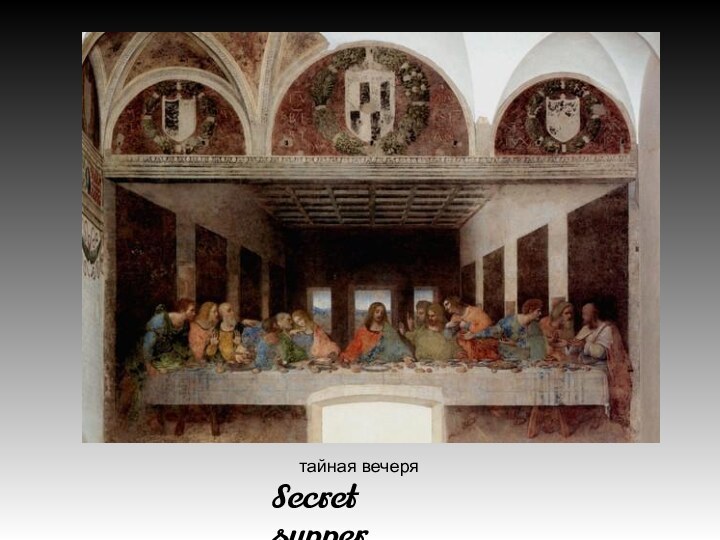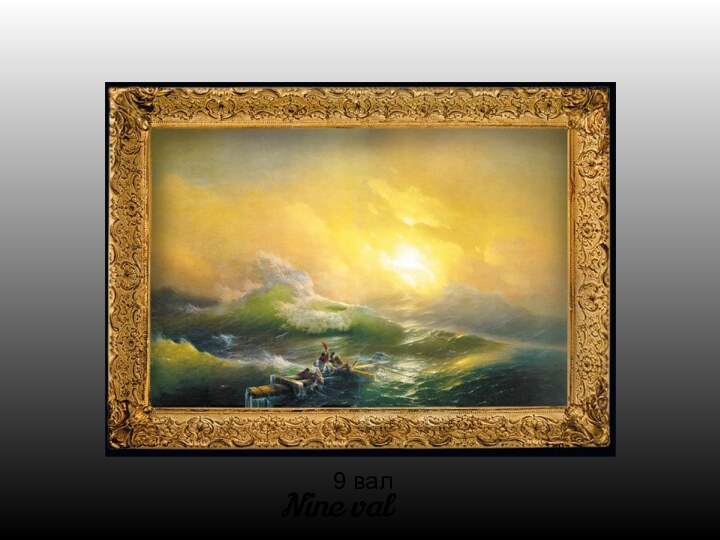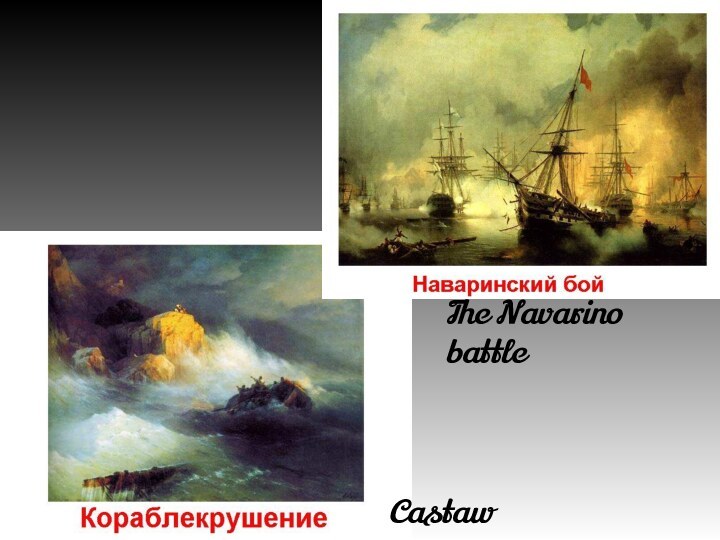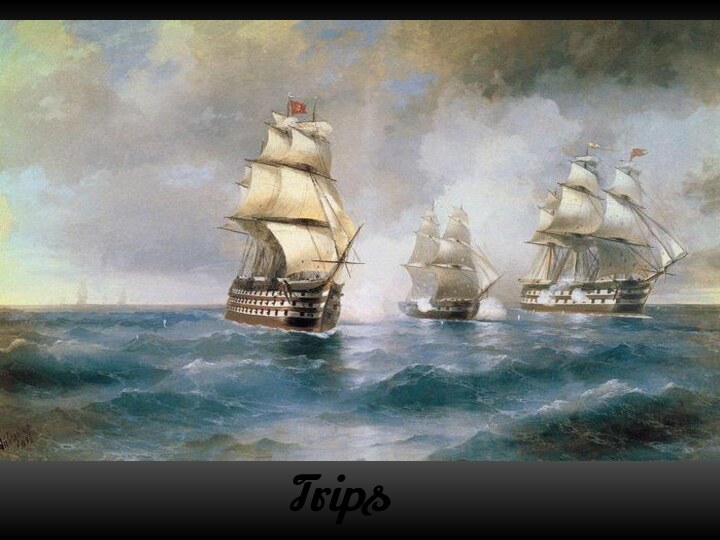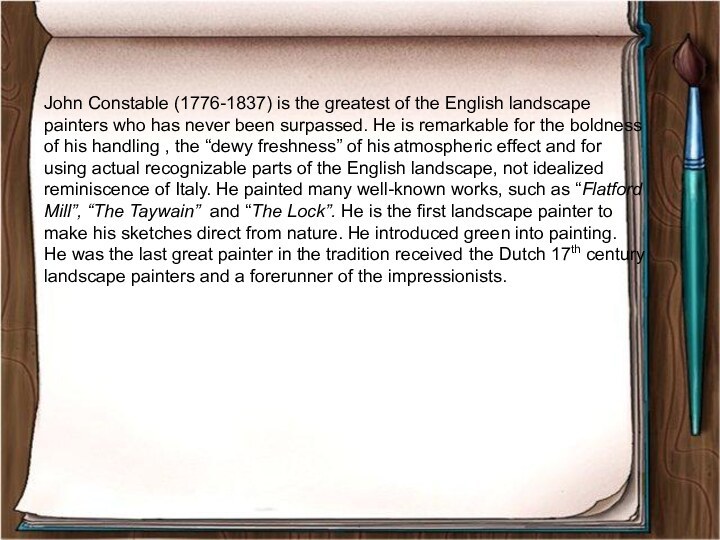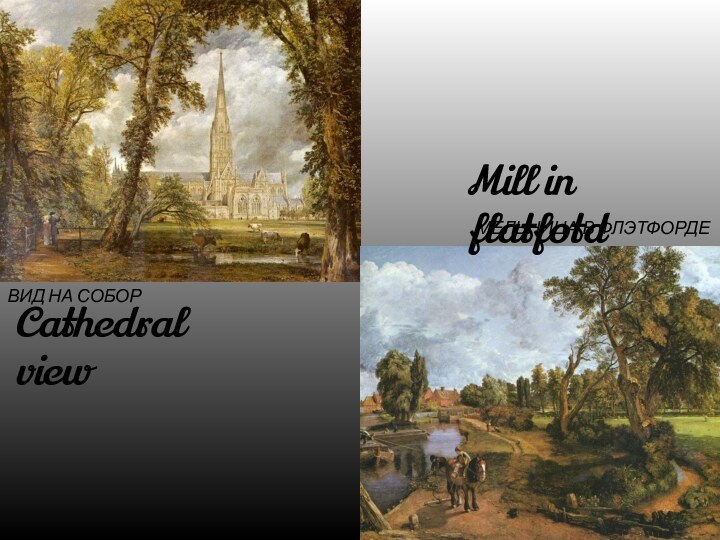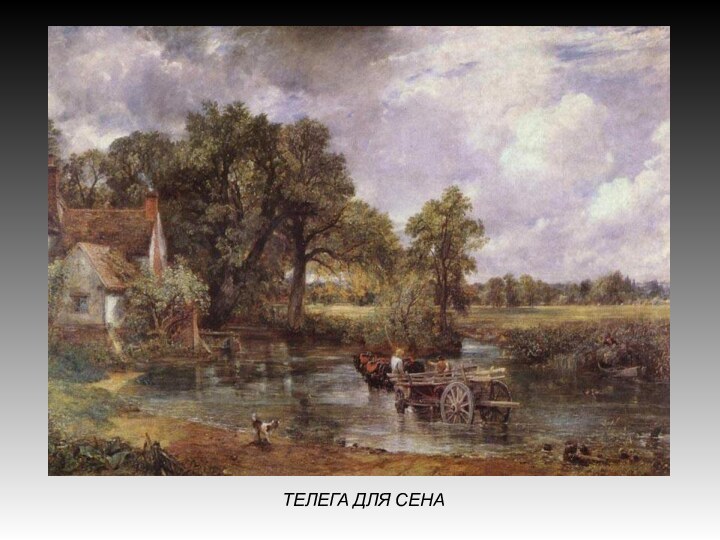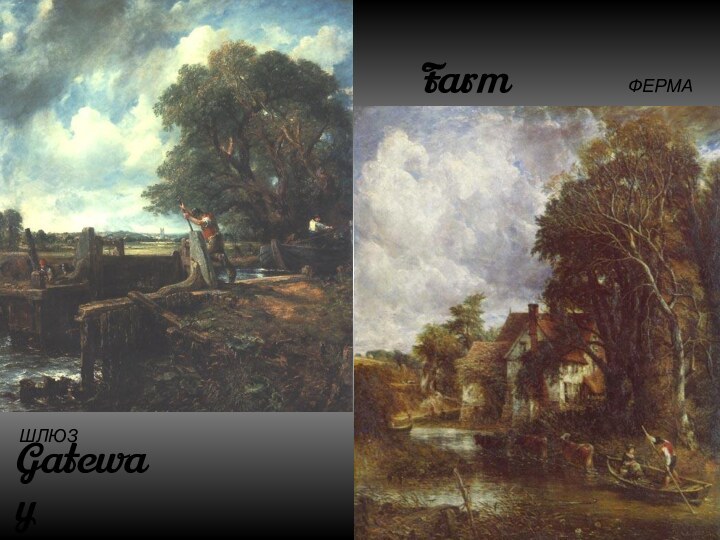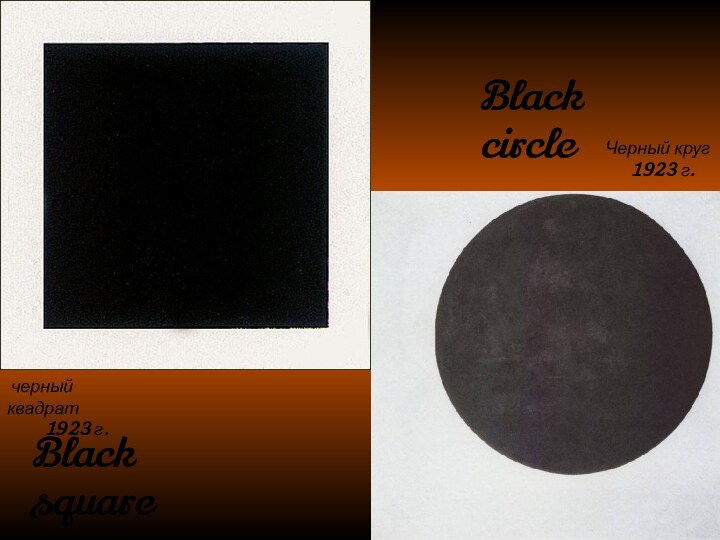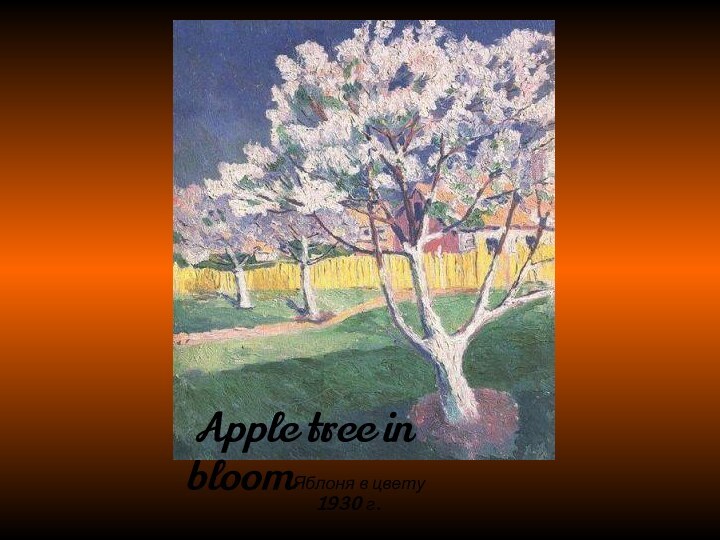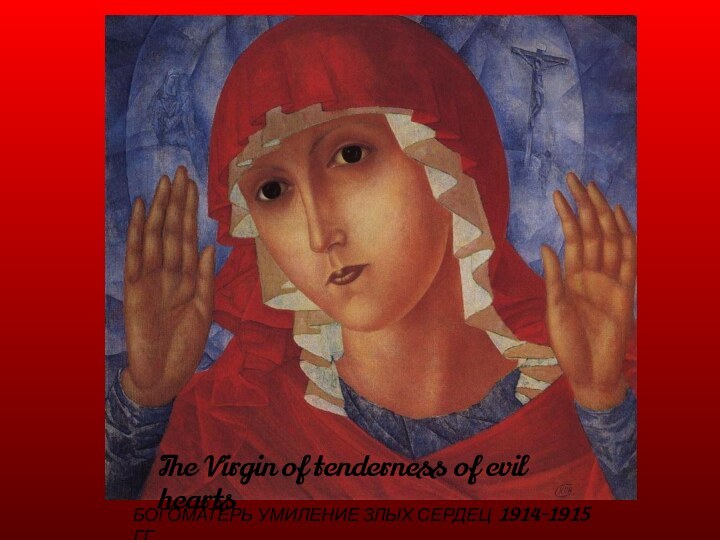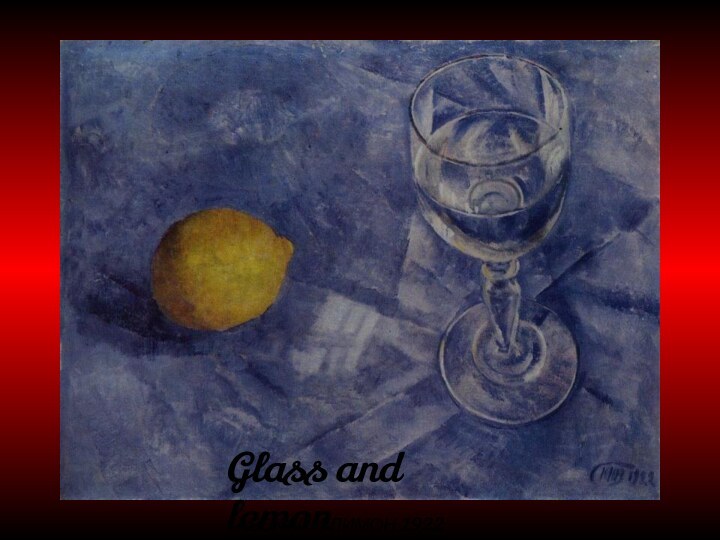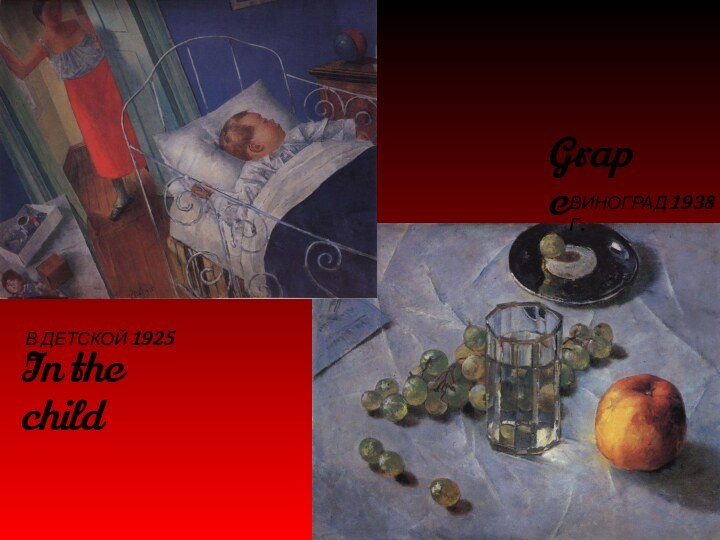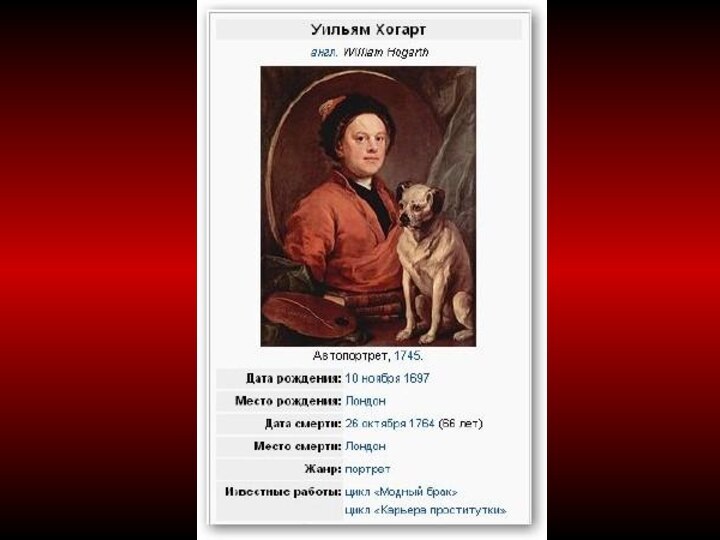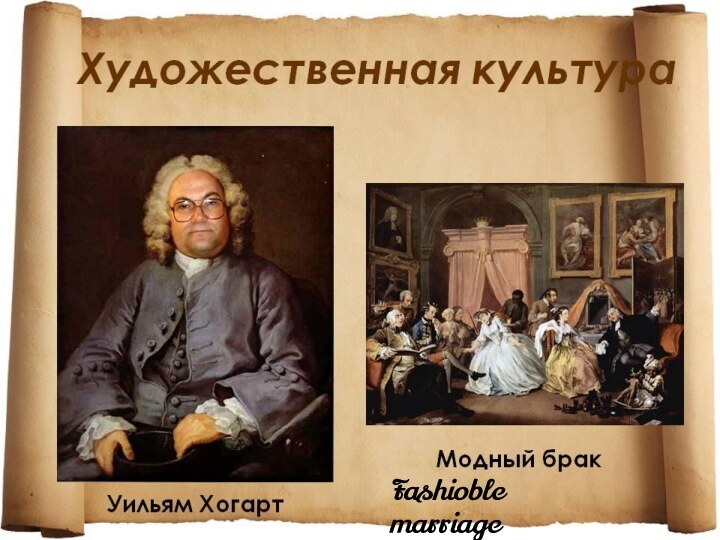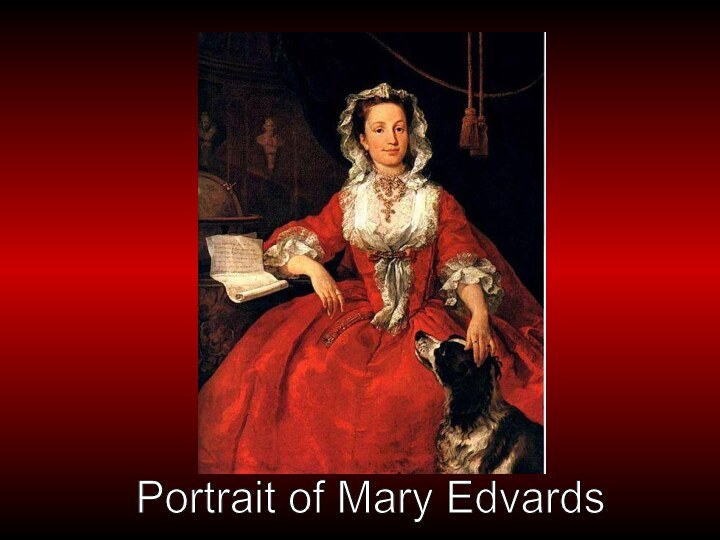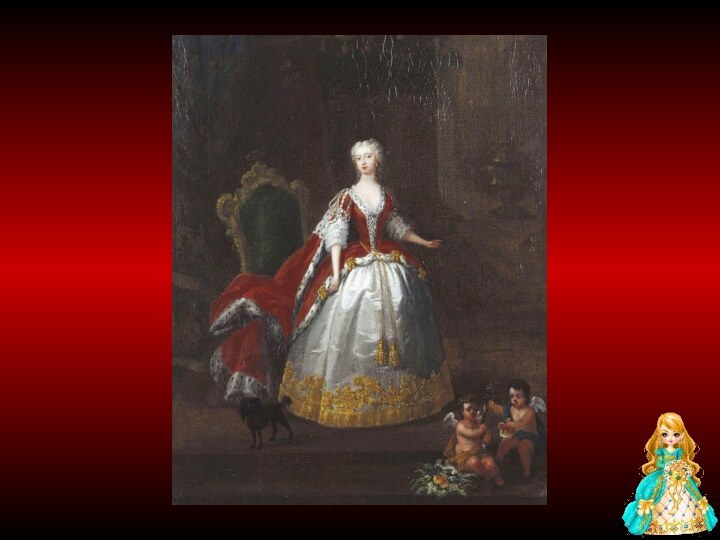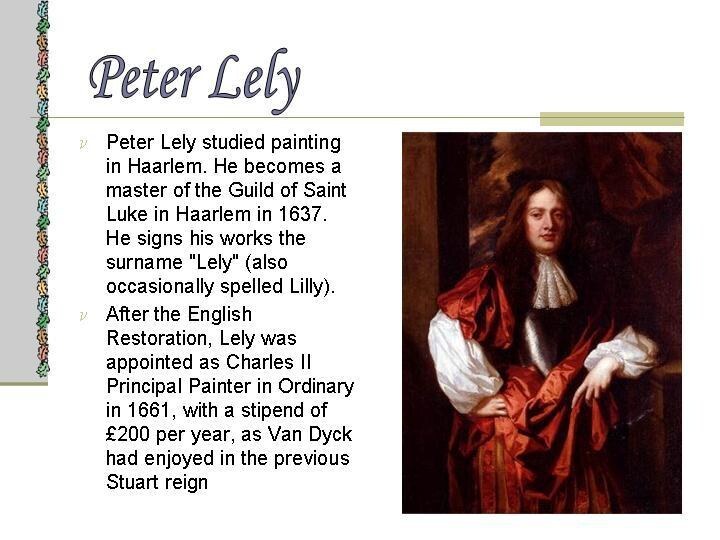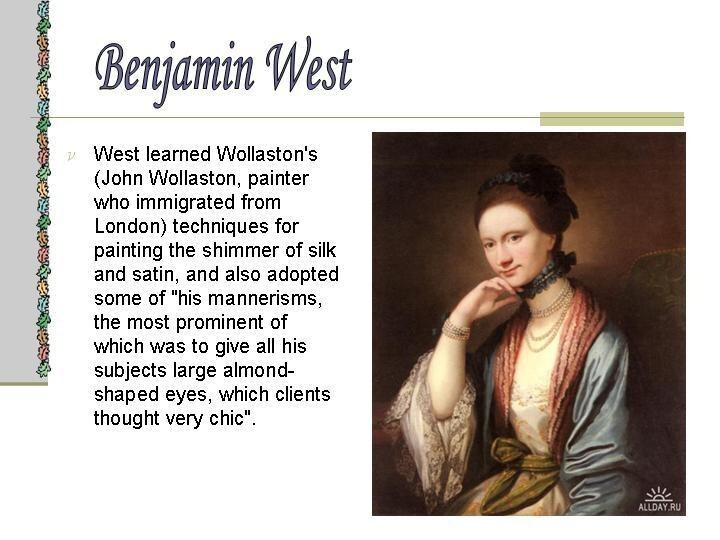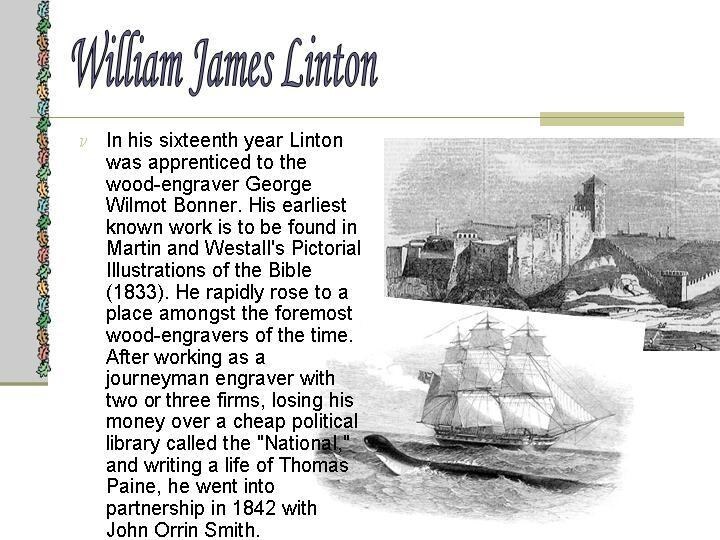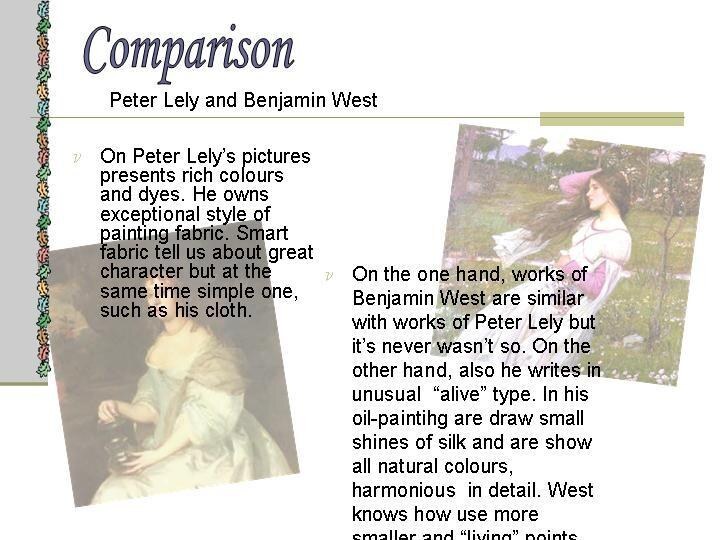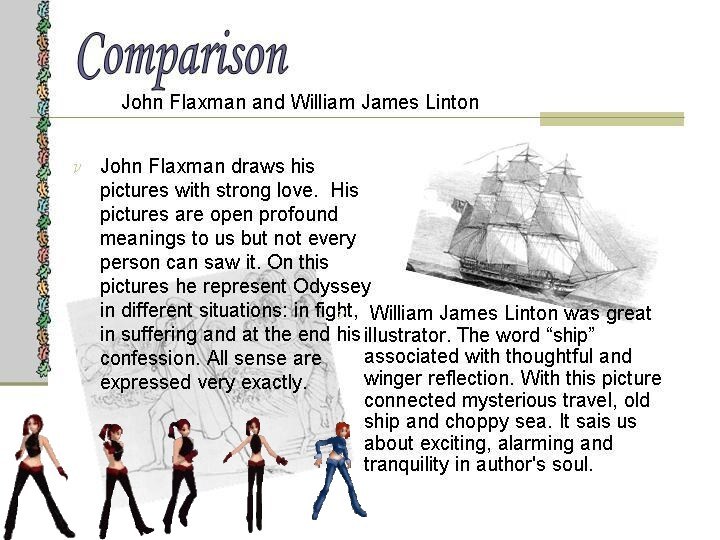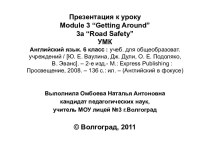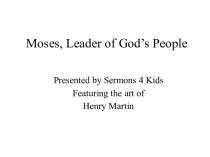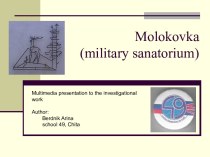Слайд 5
Thomas Gainsborough (1727-1788) is a painter and foundation
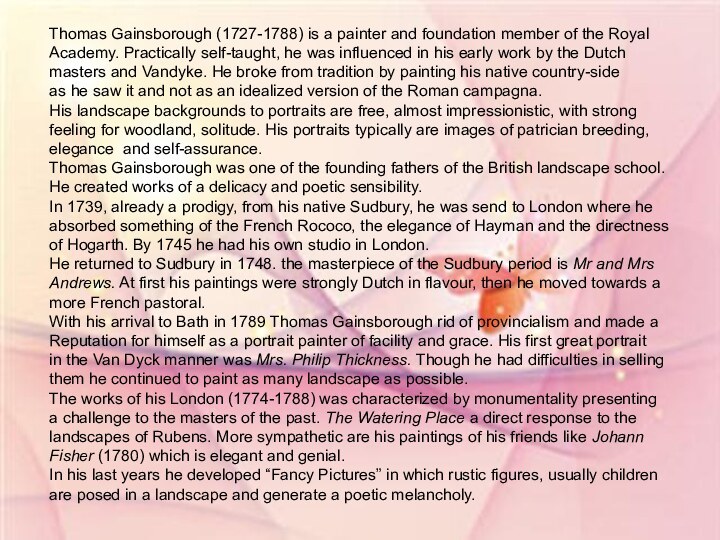
member of the Royal
Academy. Practically self-taught, he was influenced
in his early work by the Dutch
masters and Vandyke. He broke from tradition by painting his native country-side
as he saw it and not as an idealized version of the Roman campagna.
His landscape backgrounds to portraits are free, almost impressionistic, with strong
feeling for woodland, solitude. His portraits typically are images of patrician breeding,
elegance and self-assurance.
Thomas Gainsborough was one of the founding fathers of the British landscape school.
He created works of a delicacy and poetic sensibility.
In 1739, already a prodigy, from his native Sudbury, he was send to London where he
absorbed something of the French Rococo, the elegance of Hayman and the directness
of Hogarth. By 1745 he had his own studio in London.
He returned to Sudbury in 1748. the masterpiece of the Sudbury period is Mr and Mrs
Andrews. At first his paintings were strongly Dutch in flavour, then he moved towards a
more French pastoral.
With his arrival to Bath in 1789 Thomas Gainsborough rid of provincialism and made a
Reputation for himself as a portrait painter of facility and grace. His first great portrait
in the Van Dyck manner was Mrs. Philip Thickness. Though he had difficulties in selling
them he continued to paint as many landscape as possible.
The works of his London (1774-1788) was characterized by monumentality presenting
a challenge to the masters of the past. The Watering Place a direct response to the
landscapes of Rubens. More sympathetic are his paintings of his friends like Johann
Fisher (1780) which is elegant and genial.
In his last years he developed “Fancy Pictures” in which rustic figures, usually children
are posed in a landscape and generate a poetic melancholy.
Слайд 7
ПОРТРЕТ МИСИС РИЧАРД
Portrait
Of
Mrs. Richard
Слайд 8
Портрет Хенедж Ллойд с сестрой
Portrait Henedg Lloyd of
sister
Слайд 11
“The morning walk”
BY TH. GAINSBOROUGH
Gainsborough is famous for
his brilliant sense of compo-
sition, harmony and form. In
the foreground of the picture
you see a pretty slim young woman of about 25 and an
elegant young man. The woman has a very fashionable
long dress on, her face is attractive. She has dreamy
blue eyes, and thick curly golden hair. As for the man,
he is tall and handsome, the features of his face are
pleasant and expressive. His eyes are dark, his look is
proud, his mouth is rather large, his nose is straight, and
he has a classical strong figure. I am sure that the young
people are happy because they are young, they are in
love, because the day is fine, and life is beautiful. It is
an idyllic scene in a romantic landscape. Thanks to the
soft colour treatment the picture has a lyrical and poetic
atmosphere.
Слайд 14
Everyone agrees that Leonardo da Vinci (1452-1519) was
one of the greatest of all painters. His painting
"The Last Supper" is probably the. most famous painting in the world. But Leonardo would be famous if he had never painted a stroke.
For he was also a great inventor. He invented the wheelbarrow, the military tank, and roller bearings. He made plans for dozens of weapons and machines. He even experimented with airplane and submarine modes.
Слайд 15
Besides, Leonardo was great as a scientist and
engineer. He was also a poet, a musician, and
a sculptor. Perhaps no other person in history has ever learned so much in a lifetime. Certainly no one ever deserved more to be called a genius.
Leonardo was born in the village of Vinci in Italy. As a small boy he lived most of the time with his fathers parents. Leonardo was a beautiful boy, with curly hair and bright blue eyes.
When his father found out that the boy was interested in painting, he sent him to an excellent painter and teacher.
One day Leonardo painted a beautiful angel in one of his teacher's pictures. "You are a greater painter than Г, said the teacher, "I will paint no more"
Слайд 16
In a few years Leonardo's father decided that
he would pay no more to the teacher. His
son, he thought, was spending too much time studying rocks and plants, watching birds to find out how their bodies work, and building models of machines.
But Leonardo stayed on as his teachers helper. He stayed till he was nearly 25. Then he set out to paint for himself, first in Florence, then in Milan and Venice, and at the end of his life in France.
Leonardo had ideas that other painters liked to copy. "Let them" he said, "I will originate. They can copy".
Thus great painter left behind only a few paintings, he had many ideas for pictures and made many wonderful pen and ink sketches. But he had so many other interests that he found it hard to sit and paint for hours at a time.
Some of his paintings have been lost because he liked to experiment. He used colours mixed with wax to paint a wonderful mural of a cavalry battle, but the wax melted and the picture was ruined.
Слайд 17
"The Last Supper" is on the wall of
a chapel in Milan. This picture was famous long
before it was finished.
There is such beauty in Leonardo's paintings that they are as hard to describe as beautiful music. The faces of his people are full of expression. He used light and shade in a new way to make people look very lifelike.
One of Leonardo's paintings is called "Mona Liza". It is the picture of a woman with a faint smile on her face. The painting was ordered by the woman's husband. But Leonardo liked it so much that he kept it for himself. He took it to France with him when he went to spend the last years of his life as a court painter to the king of France. Now it is one of the greatest treasures of the Louvre in Paris.
Слайд 18
Mона Лиза (Джоконда) 1503
Mona LiZa
Слайд 21
Ivan Aivazovsky was born in Crimea in the
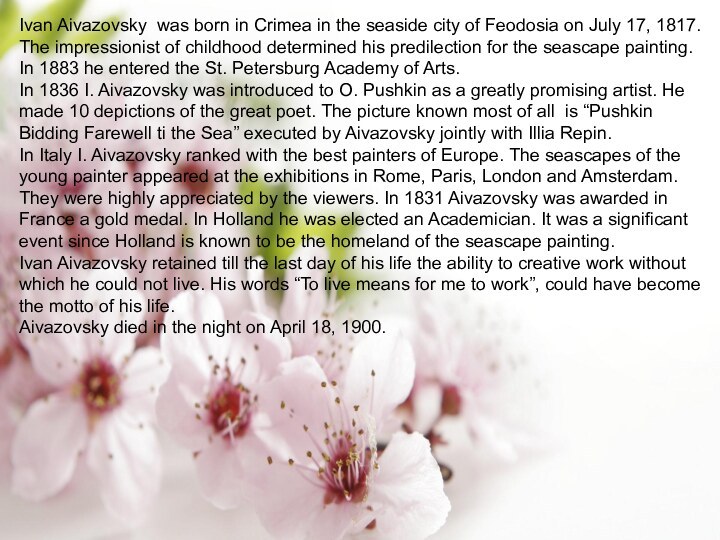
seaside city of Feodosia on July 17, 1817.
The impressionist
of childhood determined his predilection for the seascape painting.
In 1883 he entered the St. Petersburg Academy of Arts.
In 1836 I. Aivazovsky was introduced to O. Pushkin as a greatly promising artist. He
made 10 depictions of the great poet. The picture known most of all is “Pushkin
Bidding Farewell ti the Sea” executed by Aivazovsky jointly with Illia Repin.
In Italy I. Aivazovsky ranked with the best painters of Europe. The seascapes of the
young painter appeared at the exhibitions in Rome, Paris, London and Amsterdam.
They were highly appreciated by the viewers. In 1831 Aivazovsky was awarded in
France a gold medal. In Holland he was elected an Academician. It was a significant
event since Holland is known to be the homeland of the seascape painting.
Ivan Aivazovsky retained till the last day of his life the ability to creative work without
which he could not live. His words “To live means for me to work”, could have become
the motto of his life.
Aivazovsky died in the night on April 18, 1900.
Слайд 26
John Constable (1776-1837) is the greatest of the
English landscape
painters who has never been surpassed. He
is remarkable for the boldness
of his handling , the “dewy freshness” of his atmospheric effect and for
using actual recognizable parts of the English landscape, not idealized
reminiscence of Italy. He painted many well-known works, such as “Flatford
Mill”, “The Taywain” and “The Lock”. He is the first landscape painter to
make his sketches direct from nature. He introduced green into painting.
He was the last great painter in the tradition received the Dutch 17th century
landscape painters and a forerunner of the impressionists.
Слайд 27
ВИД НА СОБОР
МЕЛЬНИЦА В ФЛЭТФОРДЕ
Cathedral view
Mill in flatfotd
Слайд 31
черный квадрат
1923
г.
Черный круг
1923 г.
Black square
Black
circle
Слайд 32
Яблоня в цвету
1930 г.
Apple tree in bloom
Слайд 34
БОГОМАТЕРЬ УМИЛЕНИЕ ЗЛЫХ СЕРДЕЦ 1914-1915 ГГ.
The Virgin of
tenderness of evil hearts
Слайд 35
БОКАЛ И ЛИМОН 1922 Г.
Glass and lemon
Слайд 36
В ДЕТСКОЙ 1925 Г.
ВИНОГРАД 1938 Г.
In the child
Grape

